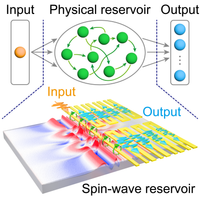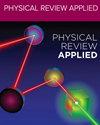Spin-wave reservoir chips with short-term memory for high-speed estimation of external magnetic fields
IF 4.4
2区 物理与天体物理
Q2 PHYSICS, APPLIED
引用次数: 0
Abstract
The experimental realization of a spin-wave reservoir chip employing ferromagnetic permalloy thin films is presented. The novel device facilitates the interference of three spherical wave-excited surface mode spin waves within a rectangular waveguide via strategically positioned slits, enabling the detection of electrical signals from surface mode spin waves across all four observation antennas. Through the experiments conducted, it is confirmed that the device functions as a one-input, four-output reservoir capable of estimating external magnetic fields. Notably, the results demonstrate the device’s capacity to retain memory up to one step prior in short-term memory tasks, while confirming the effectiveness of spin-wave interference induced by Huygens slits in enhancing nonlinearity, as observed in parity-check tasks. Furthermore, the inclusion of additional detection antennas contributes to improved learning accuracy, highlighting the significant progress achieved by the spin-wave reservoir chip. These findings underscore substantial progress toward practical implementation, with promising avenues for further development and refinement, showing its remarkable ability to process signals at high speeds, even with 0.8-ns pulse sequences.

用于高速估算外部磁场的带短时记忆的自旋波水库芯片
本文介绍了利用铁磁性超耐热合金薄膜在实验中实现自旋波存储芯片的情况。这种新型装置通过战略性地设置狭缝,在矩形波导内实现了三个球面波激发的面模自旋波的干涉,从而能够在所有四个观测天线上检测到面模自旋波的电信号。通过所进行的实验,证实该装置具有一进四出的功能,能够估算外部磁场。值得注意的是,实验结果表明,在短期记忆任务中,该装置能够保留多达一步前的记忆,同时证实了惠更斯狭缝所诱导的自旋波干扰在增强非线性方面的有效性,正如在奇偶校验任务中所观察到的那样。此外,加入额外的检测天线有助于提高学习准确性,凸显了自旋波存储芯片所取得的重大进展。这些研究结果表明,自旋波水库芯片在实际应用方面取得了重大进展,并有望进一步发展和完善,显示出其高速处理信号的卓越能力,即使是 0.8-ns 脉冲序列也不例外。
本文章由计算机程序翻译,如有差异,请以英文原文为准。
求助全文
约1分钟内获得全文
求助全文
来源期刊

Physical Review Applied
PHYSICS, APPLIED-
CiteScore
7.80
自引率
8.70%
发文量
760
审稿时长
2.5 months
期刊介绍:
Physical Review Applied (PRApplied) publishes high-quality papers that bridge the gap between engineering and physics, and between current and future technologies. PRApplied welcomes papers from both the engineering and physics communities, in academia and industry.
PRApplied focuses on topics including:
Biophysics, bioelectronics, and biomedical engineering,
Device physics,
Electronics,
Technology to harvest, store, and transmit energy, focusing on renewable energy technologies,
Geophysics and space science,
Industrial physics,
Magnetism and spintronics,
Metamaterials,
Microfluidics,
Nonlinear dynamics and pattern formation in natural or manufactured systems,
Nanoscience and nanotechnology,
Optics, optoelectronics, photonics, and photonic devices,
Quantum information processing, both algorithms and hardware,
Soft matter physics, including granular and complex fluids and active matter.
 求助内容:
求助内容: 应助结果提醒方式:
应助结果提醒方式:


